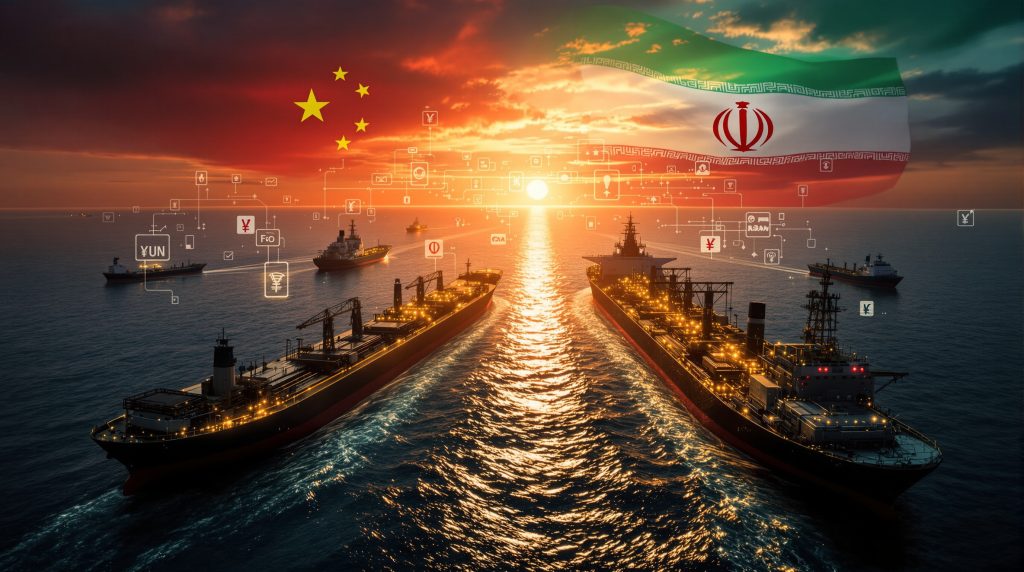Iran Defies UN Sanctions, Vows Continued Oil Exports to China
Iran has openly declared it will continue exporting oil to China despite the imminent reimposition of United Nations sanctions scheduled to take effect on September 27, 2025. This bold stance represents a significant challenge to international efforts aimed at curtailing Iran's nuclear program and regional influence through economic pressure.
Iran's Calculation: "What More Can They Do?"
Iranian Oil Minister Mohsen Paknejad recently stated that oil exports would continue regardless of new UN restrictions, arguing that existing U.S. sanctions have already created maximum pressure on Iran's economy. According to Paknejad, the snapback mechanism will not materially change Iran's situation, as they have adapted to operate under severe constraints for years.
This defiant position reflects Tehran's assessment that additional UN sanctions would have minimal practical impact beyond the comprehensive U.S. sanctions already in place since the Trump administration withdrew from the Joint Comprehensive Plan of Action (JCPOA) in 2018. Furthermore, the OPEC meeting impact has been negligible on Iran's export decisions, as the country remains determined to maintain its market share regardless of international coordination efforts.
How Significant Are Iran's Oil Exports to China?
Record-Breaking Export Volumes
Despite years of sanctions, Iranian crude exports to China have not only persisted but have reportedly reached unprecedented levels in recent months. According to industry analysts, China has become the dominant buyer for Iranian oil, with approximately 90% of Iran's crude exports now destined for Chinese markets.
| Period | Average Daily Exports to China | Change |
|---|---|---|
| 2024 (Average) | ~1.5 million barrels | Baseline |
| 2025 (Current) | ~1.8 million barrels | +22% |
These figures represent a remarkable achievement for Iran's sanctions evasion strategy and demonstrate China's willingness to continue purchasing Iranian oil despite international pressure. This situation has contributed to recent oil price rally trends, as market uncertainty grows regarding enforcement of the upcoming UN sanctions.
Economic Lifeline for Tehran
The oil trade with China provides Iran with a critical economic lifeline, generating significant revenue that helps sustain government operations and mitigate the impact of sanctions on the domestic economy. Energy exports remain Iran's primary source of foreign currency, with estimates suggesting they account for a substantial majority of the country's export earnings.
How Does Iran Evade Oil Sanctions?
The "Dark Fleet" Network
At the center of Iran's sanctions evasion strategy is what industry analysts call the "dark fleet" – a network of vessels that operate outside normal shipping channels and tracking systems. This fleet employs sophisticated methods to mask the origin and destination of Iranian oil shipments.
Key Evasion Tactics
-
Ship-to-Ship Transfers: Iranian tankers frequently transfer oil to other vessels in international waters, particularly in Southeast Asian maritime zones, making the original source difficult to trace.
-
AIS Manipulation: Vessels carrying Iranian oil routinely disable their Automatic Identification System (AIS) transponders to avoid satellite tracking, essentially "disappearing" from monitoring systems.
-
Flag Switching: Tankers regularly change their registration flags to obscure ownership and operational history.
-
"Mixed Crude" Labeling: Iranian oil is often blended with petroleum from other sources and relabeled to disguise its origin.
-
Front Companies: Complex networks of shell companies with opaque ownership structures are established to handle transactions and vessel management.
The U.S. Treasury Department has documented these tactics and has sanctioned numerous vessels and entities involved in transporting Iranian oil.
Why Sanctions Enforcement Fails
The effectiveness of these evasion methods is enhanced by several structural factors:
- Many vessels and terminals involved are Iranian- or Chinese-owned and operate within China's internal jurisdiction
- China's economic and political leverage allows it to resist U.S. pressure
- The sheer volume and complexity of global shipping make comprehensive monitoring extremely difficult
What Role Does China Play in This Defiance?
Strategic Partnership Beyond Oil
China's willingness to continue purchasing Iranian oil despite international sanctions reflects a broader strategic partnership between Beijing and Tehran. This relationship extends beyond mere economic opportunism to include:
- Geopolitical alignment against Western influence
- Shared interest in developing alternative financial systems less dependent on the U.S. dollar
- China's long-term energy security strategy
- Mutual support in international forums
The ongoing US-China trade war has further cemented this partnership, as both countries seek economic allies to counterbalance Western pressure.
Financial Mechanisms Enabling Trade
To facilitate oil transactions outside the U.S.-dominated financial system, China and Iran have developed alternative payment mechanisms:
-
Yuan-Based Settlements: Many transactions are conducted in Chinese currency rather than U.S. dollars, bypassing the American financial system.
-
Barter Arrangements: Some oil shipments are exchanged directly for Chinese goods and services.
-
Shadow Banking Networks: Complex financial arrangements involving third countries (particularly in Hong Kong and the UAE) help obscure money flows.
-
Discounted Pricing: Iran offers significant price discounts to make the sanctions risk worthwhile for Chinese buyers.
How Are "Teapot" Refineries Central to This Trade?
China's Independent Refineries Drive Demand
A key element in China's continued imports of Iranian oil is the role played by independent refineries, commonly known as "teapot" refineries due to their relatively small size compared to state-owned giants.
These facilities, primarily located in Shandong province, have several characteristics that make them ideal partners for sanctions-evading oil trade:
- Greater flexibility in sourcing crude oil
- Less international exposure and scrutiny than state giants
- Strong economic incentives to purchase discounted Iranian crude
- Often operate with tacit government approval while maintaining plausible deniability for Beijing
According to industry reports, these independent refineries operate under import quotas and can source crude oil independently, creating an ideal market for Iranian exports. In light of the projected US oil production decline expected in 2025, these refineries may become even more important buyers for Iranian crude.
What Are the International Implications?
Undermining Sanctions Effectiveness
The continued flow of Iranian oil to China significantly undermines the effectiveness of the international sanctions regime. This has several important implications:
-
Reduced Economic Pressure: The revenue from oil exports provides Iran with financial resources that blunt the impact of sanctions.
-
Diplomatic Challenges: The situation creates tensions between the United States and China, complicating broader diplomatic efforts.
-
Precedent Setting: Successful evasion of sanctions by Iran could encourage other sanctioned nations to develop similar mechanisms.
-
Credibility Questions: The inability to effectively enforce sanctions raises questions about the viability of using economic pressure as a diplomatic tool.
The Snapback Mechanism's Limited Impact
The UN "snapback" mechanism, which automatically restores all UN sanctions that were lifted under the 2015 nuclear deal, faces significant implementation challenges:
- China and Russia have contested the legal basis for the snapback
- Enforcement requires cooperation from UN member states
- Practical mechanisms for interdicting shipments are limited
- Many sanctions-evading networks are already well-established
The broader trade war impact on oil markets has created additional complexity, as global trade patterns continue to shift and fragment along geopolitical lines.
What Does Official Data Show vs. Reality?
The Discrepancy in Trade Figures
One of the most striking aspects of the Iran-China oil trade is the enormous gap between official statistics and estimated actual flows:
| Data Source | Iranian Oil Imports to China |
|---|---|
| Chinese Customs Data | No direct imports since 2022 |
| Independent Estimates | ~1.8 million barrels daily |
This discrepancy highlights the sophisticated nature of the sanctions evasion mechanisms in place, as well as China's approach of maintaining plausible deniability while continuing the trade.
Satellite and Maritime Tracking Evidence
Despite official denials, multiple independent sources confirm the ongoing oil trade:
- Satellite imagery shows Iranian tankers docking at Chinese ports
- Maritime tracking data reveals patterns of ship-to-ship transfers
- Insurance and shipping records indicate continued trade flows
- Energy market analysts consistently report substantial volumes
What Are the Economic Benefits for Both Parties?
Iran's Financial Gains
For Iran, the economic benefits of continuing oil exports to China are substantial:
- Essential foreign currency earnings estimated at billions annually
- Support for government budgets and public services
- Maintenance of oil production infrastructure
- Preservation of market share and industry expertise
China's Advantages
From China's perspective, the arrangement offers several advantages:
- Discounted oil prices
- Diversified energy supply sources
- Geopolitical leverage against Western powers
- Opportunity to expand influence in the Middle East
How Might This Situation Evolve?
Potential Future Scenarios
Looking ahead, several scenarios could unfold in the Iran-China oil trade relationship:
-
Intensified Enforcement: The U.S. and allies could increase pressure on shipping companies, insurers, and financial institutions facilitating the trade.
-
Diplomatic Breakthrough: Renewed nuclear negotiations could lead to sanctions relief and normalization of Iran's oil exports.
-
Technological Adaptation: Both countries might develop even more sophisticated methods to evade detection and sanctions.
-
Expanded Partnership: The oil trade could become part of a broader strategic alignment between Iran and China, potentially including military cooperation.
Factors to Watch
Key indicators that will shape future developments include:
- Changes in U.S. policy approach toward Iran and China
- Developments in Iran's nuclear program
- Oil price fluctuations in global markets
- Evolution of alternative payment systems
- Regional security dynamics in the Middle East
FAQ: Iran's Oil Exports to China Despite Sanctions
Why can't the U.S. stop Iran from selling oil to China?
The U.S. faces significant challenges in preventing these sales because many vessels and terminals involved operate within China's jurisdiction, limiting the reach of U.S. enforcement actions. Additionally, the complex networks of front companies and maritime evasion tactics make tracking and interdiction extremely difficult.
How does Iran get paid for its oil given banking sanctions?
Iran receives payment through various alternative channels, including yuan-denominated transactions, barter arrangements exchanging oil for goods and services, and complex financial networks involving third-country intermediaries, particularly in Hong Kong and the UAE.
What percentage of Iran's oil exports goes to China?
Independent estimates suggest that approximately 90% of Iran's crude oil exports are purchased by Chinese buyers, making China by far the largest market for Iranian oil under current sanctions.
How do these oil sales affect Iran's nuclear program?
The revenue from oil sales provides Iran with financial resources that can potentially support various government priorities, including its nuclear program. This connection is precisely why oil sanctions were implemented as part of the broader strategy to pressure Iran on nuclear issues.
Could other countries follow China's example in defying sanctions?
While some countries might be tempted to purchase discounted Iranian oil, few have China's economic and political leverage to withstand potential U.S. pressure. However, the precedent of successful sanctions evasion could encourage other nations to develop similar mechanisms in the future.
Disclaimer: This article contains speculative analysis of geopolitical relationships and future scenarios. The specific figures and timelines mentioned should be verified through official sources.
Want to Stay Ahead of Major Mining Discoveries?
Gain immediate alerts on significant ASX mineral discoveries with Discovery Alert's proprietary Discovery IQ model, turning complex mineral data into actionable investment insights. Explore why historic discoveries generate substantial returns by visiting Discovery Alert's dedicated discoveries page and begin your 30-day free trial today.




